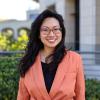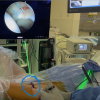Homepage News
 Starting in fall 2026, the Paul M. Rady Department of Mechanical Engineering is rolling out two major curriculum changes—guided by student feedback—that aim to rebalance credit allocation and streamline degree requirements. Janet Tsai, associate teaching professor and associate chair for undergraduate education, said the changes will help improve student learning experiences for all current and prospective students.
Starting in fall 2026, the Paul M. Rady Department of Mechanical Engineering is rolling out two major curriculum changes—guided by student feedback—that aim to rebalance credit allocation and streamline degree requirements. Janet Tsai, associate teaching professor and associate chair for undergraduate education, said the changes will help improve student learning experiences for all current and prospective students. Roughly 6.8 million people donate blood in the United States alone, helping save millions of lives, according to the American Red Cross. But just like groceries sitting on store shelves, red blood cells age over time. That's why Associate Professor Xiaoyun Ding and medical collaborators at CU Anschutz have created a new chip device to help give blood centers and hospitals a reliable way to monitor the quality of red blood cells after they sit for weeks in storage.
Roughly 6.8 million people donate blood in the United States alone, helping save millions of lives, according to the American Red Cross. But just like groceries sitting on store shelves, red blood cells age over time. That's why Associate Professor Xiaoyun Ding and medical collaborators at CU Anschutz have created a new chip device to help give blood centers and hospitals a reliable way to monitor the quality of red blood cells after they sit for weeks in storage. Assistant Professor Longji Cui is a materials expert who develops high precision instrumentation and computational techniques to explore energy transport, conversion, and dissipation at extreme scales. In this article by The Conversation, Cui explains how even something as simple as winter jackets that keep you warm during chilly days are a testament to centuries-old physics and cutting-edge science.
Assistant Professor Longji Cui is a materials expert who develops high precision instrumentation and computational techniques to explore energy transport, conversion, and dissipation at extreme scales. In this article by The Conversation, Cui explains how even something as simple as winter jackets that keep you warm during chilly days are a testament to centuries-old physics and cutting-edge science. Professor Victor Bright, Professor Emeritus Alan Greenberg and PhD student Mo Zohrabi have helped develop a laser-based imaging method called stimulated Raman scattering to improve the performance of desalination plants by allowing real-time detection of membrane fouling. The advance could help make desalination more efficient and reliable as global demand for clean water rises.
Professor Victor Bright, Professor Emeritus Alan Greenberg and PhD student Mo Zohrabi have helped develop a laser-based imaging method called stimulated Raman scattering to improve the performance of desalination plants by allowing real-time detection of membrane fouling. The advance could help make desalination more efficient and reliable as global demand for clean water rises. Assistant Professor Nicole Xu has been selected as a 2026 RIO Faculty Fellow. The program supports faculty in achieving their research and innovation goals and promotes collaboration through tailored training, experiential learning and leadership development opportunities.
Assistant Professor Nicole Xu has been selected as a 2026 RIO Faculty Fellow. The program supports faculty in achieving their research and innovation goals and promotes collaboration through tailored training, experiential learning and leadership development opportunities. PhD student Laura Shannon, alongside Professors Greg Rieker and Peter Hamlington are setting fires inside wind tunnels to gain a better understanding of how fire spreads across different terrain. The team says their findings could help keep communities safer in a world where climate-driven wildfire is becoming more common—and more dangerous.
PhD student Laura Shannon, alongside Professors Greg Rieker and Peter Hamlington are setting fires inside wind tunnels to gain a better understanding of how fire spreads across different terrain. The team says their findings could help keep communities safer in a world where climate-driven wildfire is becoming more common—and more dangerous. Faculty member Carmen Pacheco is the architect behind the Food Engineering Graduate Certificate, one of CU Boulder's most innovative academic ventures. Launched in 2024, the program was designed to introduce engineering students to the science behind their favorite foods and career opportunities in the food industry, but it can also reinforce scientific concepts that students can apply to any engineering discipline.
Faculty member Carmen Pacheco is the architect behind the Food Engineering Graduate Certificate, one of CU Boulder's most innovative academic ventures. Launched in 2024, the program was designed to introduce engineering students to the science behind their favorite foods and career opportunities in the food industry, but it can also reinforce scientific concepts that students can apply to any engineering discipline. Soil is comprised of an intricate network of bacteria and other microbes that humans depend on, but this complex environmental system is constantly shifting, making it difficult for scientists to measure. Associate Professor Gregory Whiting and his team of researchers are developing reliable, inexpensive and easy-to-deploy sensors that monitor soil in real time to help farmers optimize their use of fertilizers, reduce greenhouse gas emissions and save money in the process.
Soil is comprised of an intricate network of bacteria and other microbes that humans depend on, but this complex environmental system is constantly shifting, making it difficult for scientists to measure. Associate Professor Gregory Whiting and his team of researchers are developing reliable, inexpensive and easy-to-deploy sensors that monitor soil in real time to help farmers optimize their use of fertilizers, reduce greenhouse gas emissions and save money in the process. Assistant Teaching Professor James Harper recently led a behavioral study analyzing toilet use in Cambodia. Their goal was to introduce a new, smart toilet design that can keep rural households safe and protect the environment. But while households reported that they liked the new system, a crucial piece was missing: using it correctly.
Assistant Teaching Professor James Harper recently led a behavioral study analyzing toilet use in Cambodia. Their goal was to introduce a new, smart toilet design that can keep rural households safe and protect the environment. But while households reported that they liked the new system, a crucial piece was missing: using it correctly. Research Professor Jacob Segil collaborated with Dr. Omer Mei Dan from the University of Colorado Anschutz School of Medicine to create a redesigned surgical instrument called the CAP-LIFT cannula. The device was recently launched in October, and within the first few weeks used in over 100 successful surgeries.
Research Professor Jacob Segil collaborated with Dr. Omer Mei Dan from the University of Colorado Anschutz School of Medicine to create a redesigned surgical instrument called the CAP-LIFT cannula. The device was recently launched in October, and within the first few weeks used in over 100 successful surgeries.

